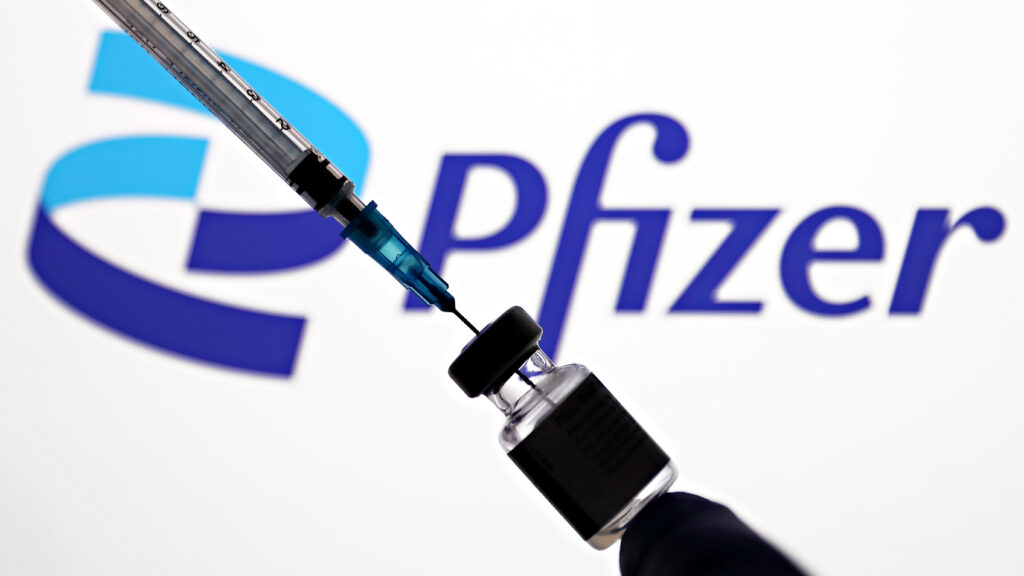Covid-19 politics force state lawmakers to ponder pharma campaign cash

WASHINGTON — Ohio state Rep. Beth Liston had accepted campaign donations from Pfizer before, but this time the check in her mailbox gave her pause.
Debates over Covid-19 vaccine policy have roiled state legislatures across the country, including in Ohio. Video footage of a physician warning state lawmakers that vaccines magnetize people went viral over the summer, and Liston, a doctor herself, took it upon herself to be the public face discrediting the conspiracy theory.
Liston is a Democrat, and she is a strong advocate for vaccination. She had never thought much of accepting a few hundred dollars from drug makers, but this year, she returned a $300 check from Pfizer and a $250 check from Johnson & Johnson to pre-emptively head off any questions about her intentions. On social media, even without the donations, people accused her of promoting vaccinations only because she is in the pocket of pharmaceutical companies.
advertisement
“I didn’t want to fuel that fire,” Liston said.
Liston isn’t the only one to return a campaign check due to vaccine politics — the Republican leader of the Tennessee Senate executed a similar return for political reasons.
advertisement
The returns may be a new signal that vaccine manufacturers’ scientific achievement may be perceived as negative by the growing anti-vaccine movement, which is driven by increased political polarization, Pete Quist, the deputy research director at OpenSecrets, said in an emailed statement.
“It is possible that this may happen increasingly if polarization continues to grow,” Quist said.
It’s difficult to quantify how widespread the practice might be right now. Contributions returned for political reasons are difficult to track, but they do happen, Quist said. Pfizer’s campaign finance disclosures showed that nine candidates and campaign committees returned checks this cycle, but they may have returned the checks for other reasons. Many politicians decline corporate contributions broadly, or some become undesirable to the campaign after the donations are made, Quist said.
However, it is a relatively rare phenomenon for candidates to return checks to donors on principle, said Ciara Torres-Spelliscy, a Stetson University Law School professor and a corporate campaign finance expert. She said it’s more common for donors to ask for their money back, perhaps after candidates become embroiled in scandal.
Drug makers run massive giving campaigns to lawmakers, and Pfizer is by far the drug industry’s most prolific donor at the state level, according to a STAT analysis of campaign finance filings. Its PAC managers and representatives wrote checks to 1,048 candidates in 43 states during the 2020 campaign cycle. Johnson & Johnson has a smaller campaign finance footprint than Pfizer, and Moderna does not have a political action committee.
Pfizer and Johnson & Johnson did not return requests for comment on the returned donations.
Ohio’s conspiracy-laden debate over vaccine politics catapulted to the national stage over the summer, and Liston found herself smack dab in the middle of it.
The Ohio House was considering a bill that would have prohibited businesses and schools from requiring any vaccines at all, not just Covid-19 vaccines. The debate over the bill crystallized in a tense hearing. One GOP-invited physician testifying, Sherri Tenpenny, spoke in favor of the bill, stating that the vaccines had dangerous side effects including blood clots, and that Covid-19 has a low death rate.
At first, Tenpenny’s opening statement sounded like run-of-the-mill anti-vaccine rhetoric. But when Liston pressed her during questioning, Tenpenny’s more extreme views emerged, including the moment, which went viral, during which she claimed people had been “magnetized” by the vaccine.
“They can put a key on their forehead. It sticks. They can put spoons and forks all over them and they can stick,” Tenpenny said.
Liston gave local and national media interviews challenging Tenpenny and spoke out on social media in favor of Covid-19 vaccines. Two weeks later, Pfizer sent her a $300 check.
Liston had accepted donations from vaccine makers before: $350 checks in October 2020 and in June 2019 from Pfizer’s political action committee and a Johnson & Johnson check for $350 in October 2019, according to state campaign finance filings. She represents a relatively competitive district outside Columbus, and it costs roughly $250,000 to run a successful campaign, Liston said.
Though Liston says she’s grateful for Pfizer’s efforts to develop and distribute a lifesaving vaccine, she ultimately decided to return the money.
She said in her experience, physicians have long been accused of pushing vaccines to profit the pharmaceutical industry. During the Ohio House hearing, Tenpenny explicitly accused people promoting the vaccine of being in the pocket of big business and lobbyists.
“I really felt strongly that my voice was going to be clearest if there weren’t concerns or questions about campaign contributions as being influential,” Liston said.
The controversial bill banning vaccine requirements was tabled, but the debate over vaccine policies in Ohio isn’t over.
The state House in November passed a bill that would ban private and public entities from requiring vaccines using “genetic vaccine technology” that is not fully approved by the Food and Drug Administration, and if a product is approved, it would grant broad exemptions. Republican Gov. Mike Dewine has already said he plans to veto it, so it’s unclear whether the bill can become law.
Tennessee Senate Majority Leader Jack Johnson, a Republican, chose to return a $1,000 check from Pfizer for different reasons than Liston.
At the time, in late September, Johnson was preparing for a three-day special session of the state legislature focused on Covid-19.
Johnson planned to sponsor a wide-ranging bill preventing businesses from forcing people to show proof of Covid-19 vaccinations, restricting the length of mask mandates, preventing minors from receiving vaccines without parental consent, prohibiting state funding for Covid-19 mandates, and restricting local health departments’ ability to quarantine people, among other measures.
Unlike Liston’s case, Johnson’s policies are contrary to vaccine manufacturers’ interests. Even so, Johnson knew that conversations with vaccine makers would be inevitable during debate on the bill. He wanted to ensure there was no question about donations being influential, a spokesman for Johnson said.
Johnson had accepted campaign cash from Pfizer before, including $6,500 in 2019 and $1,000 in 2020, according to state filings.
The legislature ultimately passed a version of the legislation that prohibits most Covid-19 vaccine mandates, allows people who lost their jobs because of a refusal to get vaccinated to be eligible for unemployment benefits, and imposes other restrictions on public health measures.
The debate over Covid-19 politics is sure to be a hot-button issue in the midterm elections later this year, and campaign contributions will garner additional scrutiny — and possibly become ammunition for advertisements and debates.
Liston said she’s concerned more broadly about the influence of money in elections, and wants candidates to know they have a choice in whether to accept or reject campaign funds.
“This donation was going to, in my mind, make it harder to advocate for what I think is right,” Liston said. “And in that case, if you come across those situations, then you shouldn’t be accepting that money.”


